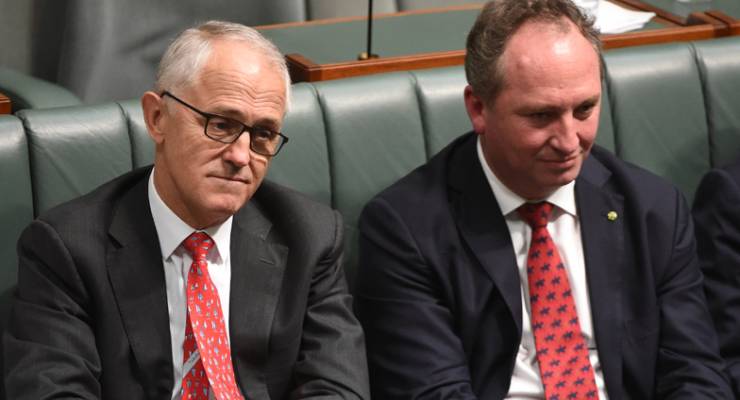
One of the best-informed interventions on the Western Australian Liberals’ ill-fated preference deal with One Nation came from former Queensland Nationals senator Ron Boswell. In early March, he criticised the deal and Industry Minister Arthur Sinodinos’s description of One Nation and Pauline Hanson as “more sophisticated”, saying the Liberals were “legitimising people voting for her. Making it safe for people to vote for her”. Boswell — himself a social conservative and climate denialist — acquired long experience fighting not merely One Nation in its first incarnation in the late 1990s, but other far right groups like the League of Rights during his time in politics.
At the same time as Boswell was warning of failing to fight off One Nation, Queensland Liberal National MPs were arguing about whether that party should be broken up to better enable LNP MPs who currently sit in the Nationals party room to differentiate themselves from their colleagues in the Liberals’ ranks.
The argument would have brought a rueful smile to Mal Brough, the former minister who left politics at the last election. As president of the Queensland Liberals in 2008, Brough fought the merger tooth and nail but lost out. The merger was driven by the Nationals and conservative Queensland Liberals aligned with former senator Santo Santoro, who had lost control of the Queensland branch to moderates and decided to throw in their lot with the Nationals. Clive Palmer pumped considerable funding into the merger, the goal of which was to bring the conservative parties’ long period in opposition at the state level to an end.
Since the merger, the LNP has lost two out of three state elections, including managing to go from one of the greatest landslides in Australian political history in 2012 to opposition in less than three years. That it is Nationals MPs who are now complaining about the consequences of what was seen at the time by many Queensland Liberals as a takeover by the Nationals is richly ironic. But it also has significant consequences for the federal Liberals.
Rather than fight off One Nation, as Boswell and previous generations of Nationals leaders did, the LNP appears set to go down the WA Liberals path and negotiate a deal with One Nation. While this may well reduce One Nation’s overall support — it is clear that a substantial proportion of One Nation voters object to any deals with major parties — it also legitimises One Nation as part of the political mainstream, to the right of the Nationals and the Liberals. As Boswell warns, this will drag the Coalition to the right.
In 2008, when the Liberal-National merger was proceeding, no one thought One Nation would rise from the grave and pose a threat to the conservatives in Queensland. The goal was winning power at a state level. Now, the merged party and a weaker generation of Nationals than the Fischer-Anderson generation is struggling to protect the right flank of the Coalition. Federal Nationals leader Barnaby Joyce has recently stepped up his rhetoric against Pauline Hanson, but as yet there is no sign of the concerted response that the Howard-era National leadership developed against Hanson.
Cementing One Nation as a permanent political player will have long-term consequences for the Liberals as well as their partners in Canberra.








No one can cement PHON to anything. PHON is more like some exotic particle made in the LHC that decays upon observation.
There you have it. PHON is just a Liberal sub-branch – should anyone ask you.
The Glum Brothers!! Gawd help this country.
The pic prompts me again to pose the question of Talcum – “why does he put up with the total, constant & often petty humiliation from the knuckle draggers of the COALition?”.
Dare them to sack you – you know it makes sense!